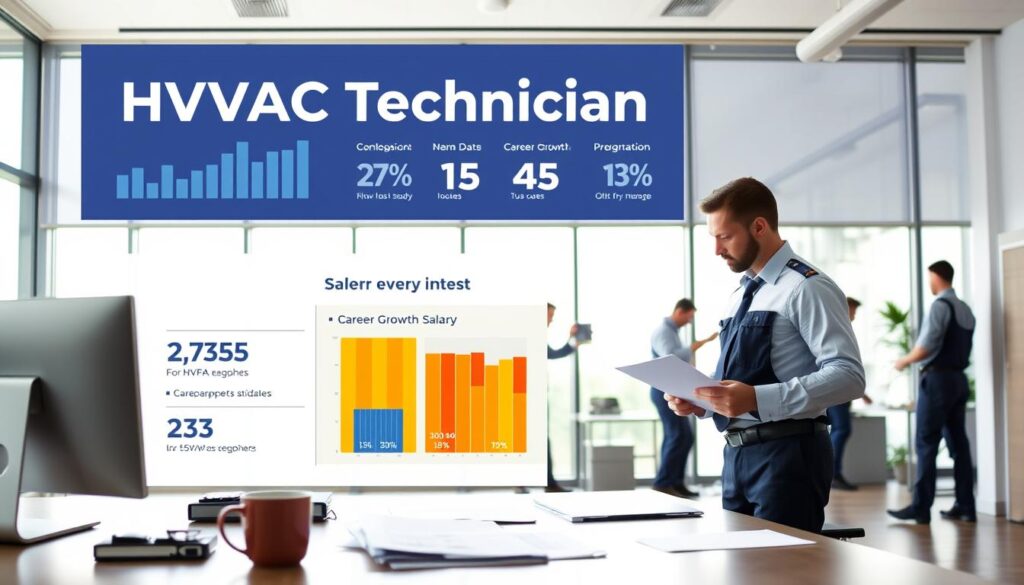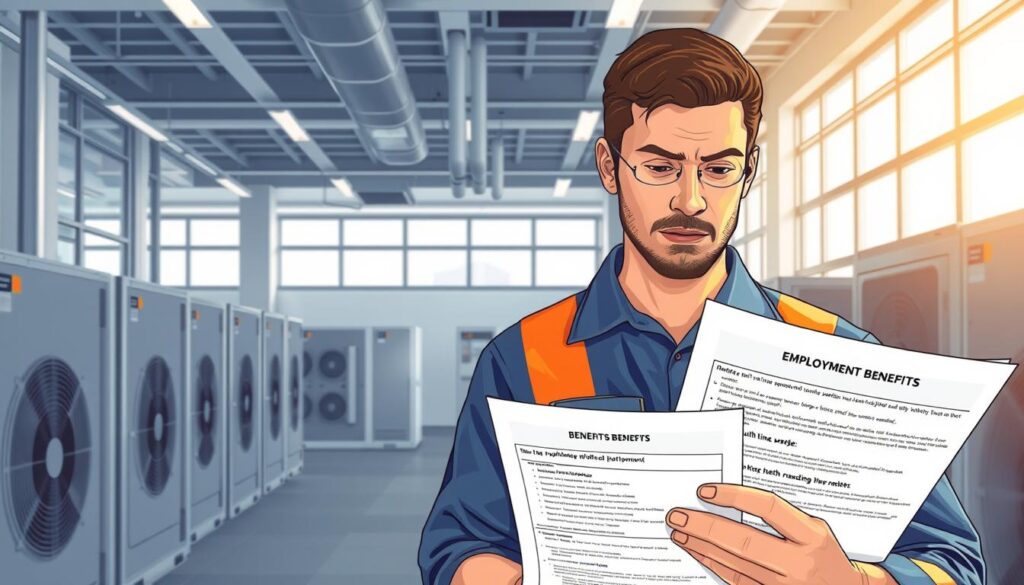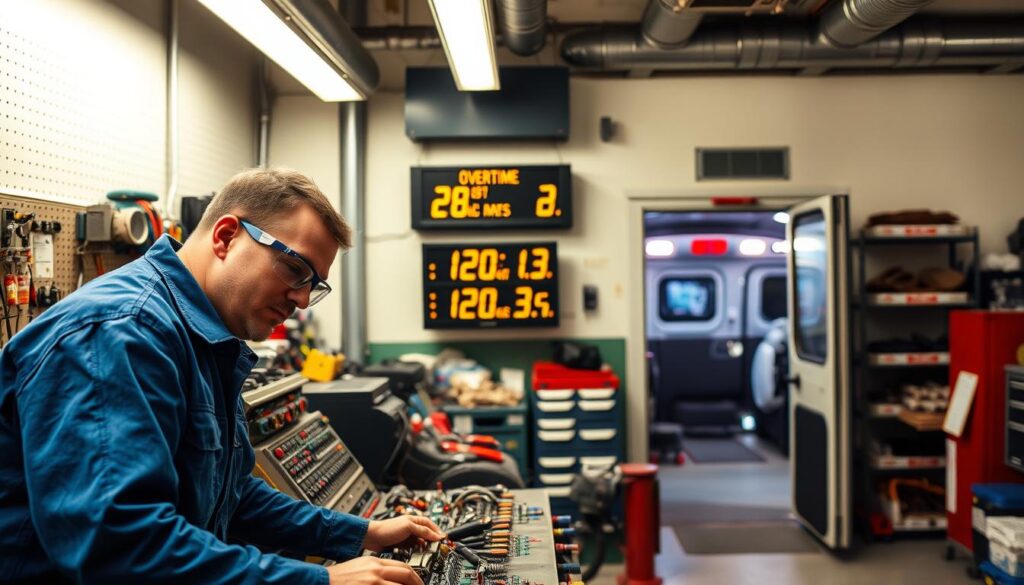Affiliate Disclosure
HVAC Guide Guys is a participant in the Amazon Services LLC Associates Program, an affiliate advertising program designed to provide a means for sites to earn advertising fees by advertising and linking to Amazon.
What Do HVAC Technicians Make? Ever wondered what makes HVAC technicians so in demand today? What’s the secret behind the systems that keep us cool and warm?

HVAC technicians are the hidden gems of comfort in our world. They make sure our spaces are just right. The salary for these experts changes as much as the systems they work on.
With new tech and climate issues, knowing what HVAC techs earn is key. These pros handle everything from home setups to big commercial jobs. They’re vital to our buildings and spaces.
Key Takeaways
- HVAC technicians enjoy competitive salaries across various experience levels
- Career opportunities continue to expand in multiple sectors
- Specialized certifications can significantly boost earning
- Regional variations impact hvac technician salary ranges
- Technological advancements create new career opportunities
Table of Contents
Understanding HVAC Technician Salary Basics
Exploring careers in the HVAC industry means knowing about salaries. HVAC tech income changes a lot, with an average pay that’s a good starting point for this skilled job.
HVAC technician pay isn’t just an hourly rate. Your earnings depend on several important factors that affect your total income.
Base Pay Fundamentals
HVAC technicians get paid in different ways:
- Hourly wages for regular work
- Overtime pay
- Bonuses for good performance
- Higher rates for special services
Salary Structure Insights
Your HVAC pay can vary a lot, based on your skills and where you work. New technicians start with lower pay, but experienced ones get more for their advanced skills.
Industry Benchmarks
To get a sense of what you might earn, look at these industry standards:
- Median annual income: $50,590 nationwide
- Bottom 10% earn around $31,910
- Top 10% can earn over $80,630
Your HVAC tech income is more than just today’s pay. It’s an investment in a promising and expanding career path.
What Do HVAC Technicians Make Across Different Experience Levels
Your HVAC career journey directly impacts your earning. Knowing the hvac salary range is key for planning your career and money growth. As you gain experience, your skills become more valuable in the competitive HVAC job market.
HVAC pay by experience follows a clear progression. This rewards skill development and expertise. Let’s break down the typical salary trajectory for HVAC technicians:
- Entry-Level Technicians (0-2 years): Typically earn between $30,000 and $40,000 annually
- Mid-Career Technicians (3-5 years): Can expect salaries ranging from $45,000 to $55,000
- Experienced Technicians (6-10 years): Often earn between $55,000 and $70,000
- Senior Technicians (10+ years): May command salaries of $70,000 to $85,000 or more
Your earning grows with specialized skills, certifications, and industry knowledge. Technicians who invest in continuous learning and develop expertise in complex HVAC systems can significantly increase their market value.
| Experience Level | Annual Salary Range | Hourly Rate |
|---|---|---|
| Entry-Level | $30,000 – $40,000 | $15 – $20 |
| Mid-Career | $45,000 – $55,000 | $22 – $28 |
| Experienced | $55,000 – $70,000 | $28 – $35 |
| Senior | $70,000 – $85,000 | $35 – $45 |
Remember, these figures can vary based on location, specialization, and individual employer. Networking, pursuing additional certifications, and staying current with industry technologies can help you maximize your HVAC career earnings.
Explore Our HVAC Shop
Looking for top-rated HVAC tools, parts, and accessories? Visit our shop and find the perfect solution for your needs.
Visit the ShopRegional Salary Variations in the United States
Understanding the landscape of heating and cooling technician wages across different regions can help you make informed career decisions. Salaries for HVAC professionals vary dramatically based on geographic location, local demand, and economic conditions.
Top-Paying States for HVAC Professionals
When exploring heating and cooling technician wages, some states stand out for their competitive compensation. The top-paying regions typically include:
- California
- New York
- Massachusetts
- Washington
- New Jersey
Metropolitan vs. Rural Area Compensation
Your earning as an HVAC technician can differ a lot between urban and rural settings. Metropolitan areas often provide higher wages due to increased demand, complex infrastructure, and higher living costs.
“Location can make a substantial difference in your HVAC technician salary” – Industry Expert
Cost of Living Adjustments
When comparing heating and cooling technician wages, it’s key to think about cost of living. A higher salary in an expensive city might not stretch as far as a moderate wage in a more affordable region.
- High-cost areas like San Francisco offer higher base wages
- Lower-cost regions might provide better overall financial comfort
- Purchasing power varies significantly across states
Entry-Level vs. Senior HVAC Technician Earnings
Your earnings in the HVAC field can change a lot as you move up from entry-level to senior technician. Knowing how salaries grow helps you plan your career and set income goals.
At the start, HVAC techs make about $60,014 a year. They’re new to the job and have basic skills and little experience. Your first salary depends on the local job market, your employer, and your training.
- Entry-level average salary: $60,014
- Typical experience: 0-2 years
- Initial certification requirements
As you get more experience and skills, your earnings can go up a lot. Senior HVAC techs with over 10 years of experience can make between $85,000 and $120,000 a year.
| Career Stage | Experience Level | Typical Annual Earnings |
|---|---|---|
| Entry-Level | 0-2 years | $60,014 |
| Mid-Level | 3-7 years | $75,000 |
| Senior Level | 10+ years | $85,000 – $120,000 |
Several things can help your salary grow. These include getting advanced certifications, learning about complex HVAC systems, and being able to handle tough projects. Keeping up with new skills and knowledge is key to earning more in HVAC.
“The HVAC industry rewards skilled professionals who invest in their technical expertise and stay current with emerging technologies.” – HVAC Industry Expert
Explore Our HVAC Shop
Looking for top-rated HVAC tools, parts, and accessories? Visit our shop and find the perfect solution for your needs.
Visit the ShopFactors Affecting HVAC Technician Compensation
Your HVAC technician salary is more than just basic pay. Many factors can change how much you earn. Knowing these can help you grow your career and increase your hourly rate.
To grow in HVAC, you need to keep learning and improving your skills. The right mix of education, certifications, and specialization can really boost your value in the market.
Education and Certification Impact
Getting professional credentials can really raise your salary. Here are some key strategies:
- Get advanced technical certifications
- Take specialized training programs
- Get industry-recognized credentials
- Keep up with ongoing professional development
Specialization Benefits
Choosing a specific HVAC area can lead to better pay. Some areas to consider include:
- Commercial HVAC systems
- Industrial refrigeration
- Green technology installations
- Advanced control systems
Industry Sector Differences
Your hourly rate can change a lot based on the industry. Residential, commercial, and industrial markets pay differently. Each offers unique chances for skilled technicians.
Expertise and continuous learning are the keys to unlocking higher earning in the HVAC industry.
Benefits and Additional Compensation Packages
HVAC tech income is more than just a salary. Skilled technicians get great packages that boost their earnings. These benefits add a lot of value and security to their jobs.

- Comprehensive health and dental insurance coverage
- 401(k) retirement savings plans with employer matching
- Paid vacation and personal time off
- Vehicle allowances for work-related transportation
- Ongoing professional training and certification support
Your total compensation package is key to your financial future. Many employers know how important HVAC techs are. They offer great benefits to keep the best people.
| Benefit Type | Average Annual Value |
|---|---|
| Health Insurance | $6,500 |
| Retirement Contributions | $3,200 |
| Paid Time Off | $4,000 |
| Vehicle Allowance | $2,500 |
“Benefits are a key part of an HVAC technician’s total compensation strategy. They offer financial security and chances for growth.” – HVAC Industry Expert
Don’t just look at the salary when choosing a job. A good benefits package can add thousands to your yearly income. Smart technicians look at the whole compensation package when deciding where to work.
Explore Our HVAC Shop
Looking for top-rated HVAC tools, parts, and accessories? Visit our shop and find the perfect solution for your needs.
Visit the ShopCareer Growth and Salary Progression
Your HVAC career offers exciting opportunities for growth and higher earnings. As you gain experience and develop specialized skills, you can unlock multiple pathways to higher income and career satisfaction.
HVAC career earnings can dramatically improve as you progress through different professional stages. Technicians who invest in their skills and seek strategic career development can significantly boost their income.
Advanced Position Opportunities
Career advancement in the HVAC industry presents several compelling options:
- System Designer: Develop complex HVAC solutions for large-scale projects
- Technical Specialist: Focus on specific system types or cutting-edge technologies
- Project Coordinator: Manage installation and maintenance projects
- Sales Engineer: Leverage technical expertise in equipment sales
Management Track Earnings
Pursuing management roles can transform your HVAC career earnings. Possible leadership positions include:
- Team Supervisor
- Operations Manager
- Regional Service Director
- Business Owner/Entrepreneur
Professionals who transition into management can expect substantial salary increases, often ranging from 30% to 50% above standard technician rates.
Strategic skill development and continuous learning are key to maximizing your HVAC career earnings.
Overtime and Emergency Service Pay Rates

HVAC technicians can earn a lot from overtime and emergency work. Your usual hourly rate goes up when you work on urgent repairs or late hours.
Emergency calls are a big money-maker for HVAC techs. In busy times like summer and winter, you get paid more for working nights and weekends. These jobs usually pay premium compensation compared to regular daytime work.
- Typical overtime rates range from 1.5x to 2x standard hourly wage
- Emergency service calls can generate up to 3x standard hvac hourly rate
- Weekend and holiday emergency repairs often receive highest compensation
Companies pay differently, but most offer good money for being on-call and fixing urgent problems. Your skill in emergency situations can really boost your earnings.
| Service Type | Hourly Rate Multiplier | Potential Earnings Increase |
|---|---|---|
| Standard Overtime | 1.5x | 50% increase |
| Weekend Service | 2x | 100% increase |
| Holiday Emergency | 2.5x | 150% increase |
“Flexibility and availability are key to maximizing your HVAC technician income.” – Professional HVAC Industry Advisor
While overtime is good for your wallet, remember to take care of yourself too. Plan your emergency work wisely to earn well without getting too tired.
Comparing HVAC Salaries to Other Trade Professions
When looking at refrigeration technician pay, it’s key to see how HVAC workers compare to others in the trade world. HVAC technicians earn well, similar to many skilled trades in the U.S.
A detailed look at salaries shows some interesting points:
- HVAC Technicians: Average annual salary of $50,590
- Electricians: Average annual salary of $56,900
- Plumbers: Average annual salary of $55,160
- Carpenters: Average annual salary of $48,260
HVAC technician pay is competitive in the trade field. Your earnings can vary based on your skills, experience, and where you work.
“HVAC technicians offer a solid career path with promising financial opportunities across various industries.” – Bureau of Labor Statistics
Choosing HVAC as your career has its perks:
- Stable demand across multiple sectors
- Opportunities for specialization
- Potential for overtime and emergency service pay
- Growing industry with technological advancements
While salary comparisons are helpful, remember that your success in HVAC depends on your skills, ongoing learning, and commitment to your work.
Explore Our HVAC Shop
Looking for top-rated HVAC tools, parts, and accessories? Visit our shop and find the perfect solution for your needs.
Visit the ShopEmployment Outlook and Future Earning
The HVAC industry is changing fast, affecting what HVAC technicians earn. Skilled workers will find great opportunities ahead. This is thanks to new tech and the need for energy-saving solutions.
Industry Growth Projections
Experts say the HVAC sector will grow a lot. The Bureau of Labor Statistics sees a strong job market for HVAC techs. They predict a 5% job growth by 2030, which means better pay for those who qualify.
- Projected job growth: 5% annually
- Estimated new job openings: 38,000 per year
- Median annual salary range: $50,590 – $79,530
Emerging Technologies Impact
New tech is changing what HVAC techs earn. Smart homes, green tech, and better energy management are creating new, better-paying jobs.
| Technology | Potential Salary Increase |
|---|---|
| Smart Home Integration | 10-15% premium |
| Energy-Efficient Systems | 12-18% salary boost |
| IoT Specialization | 15-20% additional earnings |
Investing in learning and specializing can really boost your earnings in HVAC. Keeping up with new tech is key for a successful career.
Conclusion
An HVAC technician’s salary is more than just money. It’s a chance to grow financially and professionally. The HVAC field has many paths to success, from starting out to becoming an expert.
Knowing what affects your salary is important. Things like where you work, your certifications, and experience matter a lot. Those who keep learning and stay up-to-date with new tech can earn more and move up in their careers.
Planning your HVAC career wisely is key. Focus on getting better at your job, getting the right certifications, and keeping up with new tech. The HVAC job market is strong, and there’s a big demand for skilled workers. This makes it a great career for making money.
As you move forward in your HVAC career, remember a few things. Your hard work, skills, and ability to adapt are very important. The HVAC industry is stable and rewarding, with good pay and chances to grow personally and professionally.

